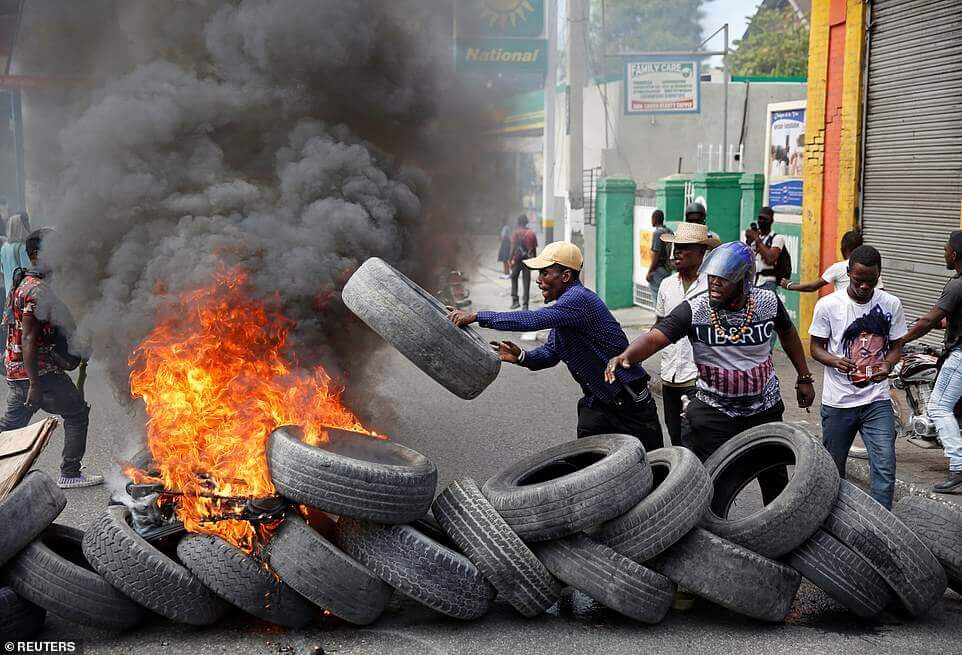Hundreds of Haitian protesters have continued to march through the streets of the capital city, Port-au-Prince, demanding the immediate resignation of President Jovenel Moïse, resulting in what the United Nations has called a “spectre of unrest” that has been met by “violent repression” from the ruling government.
The protests have in large part been organised by opposition leaders amidst a prolonged economic crisis. The demonstrators have called for the United States (US) to intervene and stood outside the US Embassy to call on the Biden administration to push the Haitian government to hold parliamentary and presidential elections earlier than September, when they are currently scheduled for.
The police have reportedly responded by firing rubber bullets, throwing rocks, firing tear gas, and setting up barricades to disperse the protesters. One protester was even shot in the head by a bullet, while another was shot in the arm.
Moïse, meanwhile, has shown little interest in meeting the demands of protesters, saying that his term ends in February 2022, but that he is willing to hold discussions. In a national address he said, “Haitians must understand that they have to collaborate to resolve the country's problems - no one is coming to rescue them.”
Opposition leader André Michel, who leads the Democratic and Popular Sector, however, said, “Haitian people are tired of Jovenel Moïse; he will no longer be able to govern the country.”
The legitimacy of Moïse currently rests on shaky ground, given that he is leading by decree, since Haiti was unable to hold legislative elections in October 2020 due to “widespread unrest and a crippling economic crisis”. Consequently, most lawmakers’ terms have expired. In fact, parliamentary elections were originally scheduled for October 2019, but could not be conducted due to “political gridlock and protests” that caused schools, businesses, and many government offices to shut down.
On this topic, prior to Trump’s exit from the White House, erstwhile Secretary of State Mike Pompeo said on January 15: “Haiti’s legislative elections are now overdue. We continue to call for elections as soon as technically feasible. We understand that the OAS secretary-general has called for those elections to be held by the end of January.”
.@SecPompeo: #Haiti’s legislative elections are now overdue. We continue to call for elections as soon as technically feasible. pic.twitter.com/g7U5rnFO5B
— U.S. Embassy Haiti (@USEmbassyHaiti) October 15, 2020
The opposition contends that Moïse’s five-year term ends in February 2021 because his predecessor Michel Martelly’s term expired in February 2016. The President, however, argues that his term actually began in February 2017, since his inauguration was delayed by a year, during which Haiti was ruled by a provisional president due to severe mismanagement of the electoral process.
Since dissolving the parliament in January 2020, Moïse has been accused of corruption, after he and others of his administration were accused of embezzlement of funds. At the same time, he has also been criticised for political suppression, particularly after he said that “robbery, arson, and blocking public roads” would now be termed as terrorism. Furthermore, he established a parallel intelligence agency that “answers only to the president”, and has also restricted the influence of the courts.
While the ruling PHTK party may argue that Moïse was elected into office with over 50% of the votes and thus holds the support of the majority of the country, voter turnout only stood at 21%.
Against this tense backdrop, the United Nations’ Human Rights Office (OHCHR) reported that “criminal activities, such as kidnappings, gang fights, and widespread insecurity have increased”. Hence, the OHCHR spokesperson, Marta Hurtado, urged the Haitian government to take “immediate action” and ensure that “law enforcement officers abide by international norms and standards regarding the use of force when dealing with protests; as well as ensuring that gangs do not interfere with people’s right to demonstrate peacefully”.
With widespread protests virtually every year that are only growing more violent and are only being met with more brutality from security forces each year, it is clear that the demands of the Haitian citizens are not being met and that their concerns are not being heard. In fact, the UN estimates that 133 people were killed during protests between October 2018 and December 2019, with 60 of them killed by the police, while the other 73 were largely killed by gang members. It appears that the current iteration of protests appears to be going down the same disastrous path. Given that roughly 60% of Haiti’s population makes less than $2 a day, the need for a swift resolution to this continued strife is of utmost importance.

